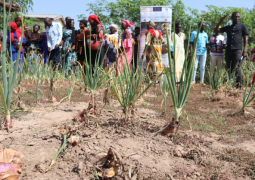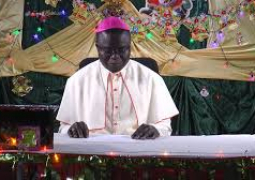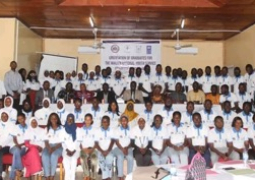The day is commemorated annually on the 10th of December. In honour of the event, the Sir Dawda Kairaba Jawara International Moot Competition was held, whose theme, this year, was ‘State Responsibility in Respect of Human Rights of Migrants in Africa’.
At the event, Malick H.B. Jallow, law Faculty and Acting Dean said that the day is designed to reflect on how far ‘we have come as a country’ as far as the promotion and protection of human rights is actually concerned.
“It is not fortuitous that the most important continental human rights body is situated here in the Gambia. It is not fortuitous also that the most important or the frontline legal instruments for the protection and promotion of human rights in Africa, is called the Banjul Charter, clearly attributes to the instrumental role that Gambia played, and particularly our former President, Sir Dawda Jawara, in his formulation, contextualisation and eventual adoption.”
Jallow indicated that it is also not fortuitous to have, of more recent vintage, a fully fledged national human rights commission, an independent body tasked with the role of protecting and promoting human rights in the Gambia.
“And certainly it is not fortuitous that we anticipate to have a fully fledged anticorruption commission. We can also probably anticipate to have a new constitution that would ensure the greater respect, perhaps, for human rights. We could also, perhaps, bear to anticipate that there would be a process of accountability for some of the excesses of the past as far as human rights are concerned. It is quite important that: 1. In providing redress for victims, but also in providing accountability, which, ultimately, we hope would have a deterrent effect and ensure that some of these excesses do not rear up again in our existence.”
Emmanuel D. Joof, chair of the National Human Right Commission, told the audience that the farming communities in The Gambia continue to battle with the consequences of environmental degradation, thereby exposing the young people to risky migration patterns.
“The Gambia over the years has served as a destination to economic migrants and refugees from the sub-region and increasingly, it is becoming a country of transit and return of migrants. Nationals from The Gambia are ranked high among migrants undertaking the Central Mediterranean route from Sub-Saharan Africa, mainly through Libya, Tunisia, Algeria enroute to Italy.
“They are likely to be more vulnerable during their migratory journeys. I am sure you have all seen and watched videos of these happening to African migrants going through the Mediterranean.” he disclosed.
“You would probably know that the UN theme on Human Rights Day, which is today for your information, which call the Independence Day of all Human Rights Institutions and Organisations. Today is our Independence Day and that is why we are celebrating it. But the theme of today coined by the UN is equality and it is taken from article one of the Universal Declaration of Human Rights and it says all human beings are born free and are equal in dignity and rights.”
He advised that governments around the globe to focus more on the general situation of the rights of migrants and to endeavor to protect their fundamental rights so that they and their families can live in equality and dignity.
“Furthermore, the 2030 agenda underpinned by human rights provides a comprehensive blueprint for sustainable development and the realization of human rights for all people everywhere without discrimination.” she concluded.





